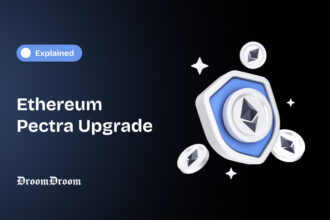The cryptocurrency market has come a long way since the inception of Bitcoin in 2009. Besides the rise of a plethora of altcoins seeking to gain market dominance, various cryptocurrency exchanges across the globe have entered the space to bolster widespread adoption. Exchanges like Binance and Coinbase have significantly reduced the complexity involved in buying and selling crypto assets. However, due to the centralized nature of these exchanges, there is a significant trade-off between convenience and large liquidity pools with security and privacy. The fallout of the recent FTX collapse has once again highlighted major pitfalls of centralized exchanges (CEXes) while sparking a narrative shift towards decentralized exchanges (DEXes) as a more viable option to trade crypto securely.
A DEX is a marketplace where users can trade and store crypto assets without the need for an intermediary. DEXes execute trades automatically through the use of smart contracts and blockchain technology. DEXes give users full ownership of their crypto assets. This is in stark contrast to their centralized counterparts, wherein users rely on a third party to manage their funds.
Centralized Exchanges and Their Drawbacks
Centralized exchanges (CEXes) facilitate the trade of crypto assets between users through order books. These exchanges operate as intermediaries in trades and act as custodians by storing and managing users’ private keys that enable access to their assets. Third-party custody is a hallmark of TradFi; therefore, CEXes are akin to exchanges in the traditional financial realm. While individuals can self-custody their assets by transferring them to their non-custodial crypto wallets, the convenience offered by CEXes to store assets directly on the platforms caters to newcomers entering the space.
Furthermore, these marketplaces make it extremely simple for novice investors to enter the crypto ecosystem by seamlessly integrating fiat on-ramps. CEXes also offer high liquidity and a variety of crypto assets and trading pairs. Given these advantages, it is easy to see why centralized exchanges remain the prevalent model for driving widespread crypto adoption.
However, the application of CEXes as a platform to securely trade and store crypto assets has come into question since the onset of the crypto space. Several high-profile hacks and bankruptcies of CEXes such as Mt Gox, QuadrigaCX, and Thodex to the most recent FTX implosion and other centralized lending platforms have resulted in enormous loss of customer funds. Despite CEXes recognizing the need for greater transparency through Proof of Reserves, public trust and confidence in centralized entities are eroding due to the demise of these poorly run exchanges.
The failure of large-scale centralized exchanges has highlighted the main drawbacks of the CeFi model while empowering the need for a decentralized economy. A single point of failure coupled with malicious actors or founders is a recipe for disaster. Centralized exchanges are precisely the financial intermediaries that Bitcoin was created to disrupt. At its core, cryptocurrencies and blockchain technology embody a decentralized future of peer-to-peer, authentic, and transparent transactions. Therefore, the recent spate of centralized debacles has rekindled a shift to the philosophical roots of crypto of transferring authority from central powers to the hands of users.
FTX's collapse is not a crypto failure. It's a failure with CeFi, @GaryGensler, and Sam Bankman-Fried. Decentralization is the point. Watch below for more thoughts 👇 pic.twitter.com/VYacafc0ZD
— Tom Emmer (@GOPMajorityWhip) November 22, 2022Understanding DEXes
Decentralized Exchanges or DEXes are platforms or marketplaces that facilitate the trade of cryptocurrencies without the need for centralized intermediaries. It is a peer-to-peer exchange built on blockchain technology and uses smart contracts to execute trades automatically.
Furthermore, while CEXes maintain a record of all transactions on their internal database, transactions on DEXes are settled directly on the blockchain, giving users complete transparency and verifiability of all trades. In the absence of centralized parties, DEXes are non-custodial by nature. This means that users have complete control of their private keys and, by extension, their cryptocurrencies.
Uniswap and Sushiswap are Popular DEXes in terms of trading volume and market share that are built on the Ethereum blockchain. However, many DEXes that utilize other blockchains, such as PancakeSwap on the Binance Smart Chain and countless other platforms on various blockchain networks, have emerged. According to CoinMarketCap, there are over 350 different DEXes for users to choose from.

While DEXes emerged in 2016 with platforms like EtherDelta, the DEX ecosystem has certainly matured since then. The space has evolved not only in terms of the variety of DEXes but also in terms of UI enhancements and advanced trading features like perpetual contracts in platforms like DYDX and GMX.
The DEX sector is teeming with innovation, and with continued technological advancements in the space, they are rivaling the features offered in the centralized model. Along with innovation, growing concerns about the security of CEXes have ignited a shift in focus toward the various benefits DEXes have to offer. As a result, global crypto trade volumes on DEX platforms have been steadily increasing versus CEX marketplaces.
DEX vs CEX volume ratio is at an all time high
up 25% since the FTX collapse
🚀 pic.twitter.com/TPpaTMDokX
— hayden.eth 🦄 (@haydenzadams) March 24, 2023The Benefits of Using DEXes
DEXes are an integral part of the crypto ecosystem. They abide by the fundamental tenants this space was built for, which include self-sovereignty, transparency, security, privacy, and trustless transactions. There are several advantages for users opting to transition from the centralized model to true decentralization.
Custody
Unlike centralized platforms, DEXes are non-custodial, which means that users do not need to relinquish their private keys to a third party. Instead, users interact with a DEX platform by connecting their personal crypto wallet. Read this article to learn more about the importance of self-custody and crypto wallets.
Security
As DEXes empower users to self-custody their digital assets, this effectively places complete ownership in the hands of the user and eliminates any centralized counterparty risks. By trading and storing crypto assets on CEXes, users not only entrust their private keys with a middleman but also rely on these exchanges to not halt trading or withdrawals. Furthermore, with the transparent nature of blockchain technology, concerns about insider trading, hacks, mismanagement of funds, and bankruptcies are eliminated on a DEX.
Day 79
Why is Decentralization important?
The existing centralized finance is tilted in favour of insiders
You are playing a losing game. Insiders know how to chip off your savings without you knowing
True Decentralization eliminates the concept of ‘insider’#BuildForCrypto
— Nischal (Shardeum) ⚡️ (@NischalShetty) April 21, 2022Privacy
Anonymity and privacy are core principles of cryptocurrencies and blockchain technology. DEXes uphold these values by allowing users to trade cryptocurrencies without the need for them to disclose any personal data. On the other hand, many CEXes typically require users to complete KYC procedures to set up an account.
Transparent Transactions
Trustless transactions are a fundamental value proposition of blockchain technology. The immutable, transparent, and censorship-resistant nature of blockchain-based transactions fosters tremendous trust. Trades executed on DEXes are recorded on the blockchain and are publicly visible. Therefore DEXes provide unparalleled transparency compared to CEXes, wherein transactions are overseen by a central authority which can be prone to errors or mismanagement of user funds.
Diversity of Tokens
While many CEXes offer a variety of cryptocurrencies, they pale in comparison to the diversity of tokens available on most DEXes. This is because tokens on major centralized platforms often pass through rigorous vetting processes before being listed. Finding tokens early have a high-value proposition, especially if they are listed on CEXes in the future. That said, investors must exercise a high degree of caution, due diligence, and research when buying obscure tokens available on DEXes.
Closing Thoughts
With mounting concerns about the security of CEXes, DEXes have appeared as platforms for a more transparent and safe crypto trading ecosystem. While the likes of Binance, Coinbase, and many other global entities have undoubtedly bolstered crypto adoption, recent insolvencies have yet again highlighted the drawbacks of traditional centralized institutions.
DEXes are an evolving sector in the growing DeFi ecosystem. Therefore there are specific considerations that users must take into account. For instance, education about the space is critical for users looking to enter the DEX realm. This includes how to use crypto wallets and securely store one’s assets since the user is the sole custodian.
The past indicates that CEXes have offered convenience but at a significant cost of ownership, security, and transparency. 2022 was a year mired by the failures of the centralized model. The classic saying “not your keys, not your crypto” holds true more than ever.
Bitcoin and the crypto movement spawned out of the 2008 financial crisis and deep distrust in centralized financial institutions. Decentralized exchanges pave the way for fully embracing Satoshi’s vision of individual ownership and self-sovereignty.




















